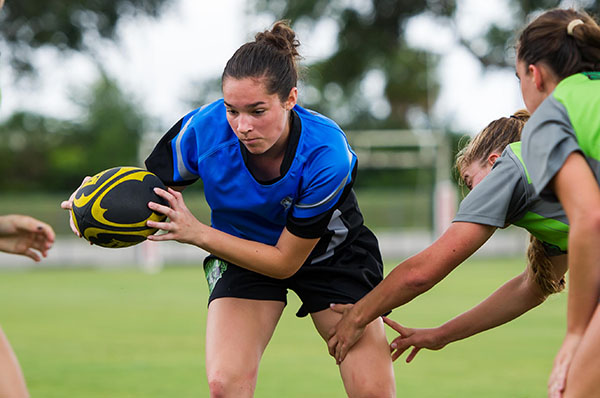Rugby is the fastest-growing team sport in America, and the Wellington Wizards Rugby Club has caught the wave, helping grow in the sport in South Florida.
Ron Vargo, first vice president of the Wellington Wizards, gave a presentation to Wellington’s Park & Recreation Advisory Board on Monday in hopes of becoming one of the village’s official registered sports providers.
Parks & Recreation Director Bruce DeLaney said the Wizards have discussed becoming an official provider for the village for some time, and representatives were there to give an update on the status of the club and its relationship with the village.
“At our next meeting in September, we will look for a recommendation from this board as to whether or not we would like to approve the Wizards rugby organization as a sports provider,” Delaney said, explaining that the application would then go to the Wellington Village Council for approval. “They would then become our eighth sports provider.”
Vargo, who coaches the high school division of the Wizards, thanked Wellington officials for giving the Wizards provisional status over the past year.
“It allowed us to give almost 100 kids a permanent place,” he said. “For the first few years, we had been bouncing from place to place.”
The club organized in 2014, and its first season was 2015.
“We’ve had some good success, but unfortunately, with the number of kids we had, we were renting fields,” he said. “We had a brief association with the Acreage Athletic League. They were very welcoming, but unfortunately, they didn’t really have the facilities structured to accommodate us. From the beginning, our name was Wellington Wizards, and it was our intention to be in Wellington.”
The club has grown from about 30 players in 2015. “We had a state championship that year with U14,” he said. “In 2016, we doubled in size. We had more than 70 players. We were able to add a high school junior varsity age group. This past year, we were able to grow to over 90 players. With us being allowed into Wellington, it really helped recruiting, and just having a steady, permanent place helped with player and parent satisfaction.”
The club subsequently added a varsity division, as well as a girls high school division.
Rugby, according to the Sporting Goods Manufacturers Association, is the fastest-growing team sport in America, Vargo said.
“The girls divisions are a big part of that,” Vargo said. “There was one girls team in the state last year. We went from one to six this year, including us, so we’re extremely happy with that.”
The girls play in a girls-only division at the high school level and play co-ed in the younger divisions.
Vargo noted that rugby is a college scholarship sport and has other opportunities for children, including a World Cup that was featured in last year’s Olympics in Rio de Janeiro. Rugby sevens, as opposed to the standard 15-player teams, has come back after a 90-year hiatus away from the Olympics, he said.
“There’s opportunities for kids to go on and play the sport for the rest of their lives,” he said. “They can play in college. They can play in clubs around the country. They can play for their country.”
Although the varsity teams were established just this year, the club already has colleges recruiting its players.
“We have one young lady in the audience being recruited by Army,” he said. “She has been invited to its Young Leaders Program that is available only to a very select few high school juniors. Hopefully, she will go on to play with Army.”
Vargo added that a first-year male player is being recruited by Penn State.
Rugby teaches players respect, he said, which was what drew him to the sport.
“It comes out of a tradition of respect for each other, for your team members and your opponents and your referees,” he said, pointing out that games have only one referee for 30 players on the field. “You never have any behavioral issues. If a player speaks to the referee at all, he addresses him as ‘sir’ and does what he says.”
With all the recent attention to injuries in sports, Vargo said it is important to note that rugby is considered safer than football, and by most studies is on par with soccer with regard to safety.
“This might be counterintuitive,” he said. “You might think, ‘Why would this be?’ You don’t wear a helmet, and it’s a tackle sport. The reason is because of the way contact is taught and officiated, and the approach to the game.”
Vargo noted that there is a big push now to make football safer, and several university football teams are teaching rugby-style tackling.
“In rugby, the head has always been out of the game out of necessity,” he explained. “Obviously, you have no facial or head protection.”
During board comments, Board Member William Flack noted that Boynton Beach and Boca Raton now have young teams.
“The last time we heard a presentation, you were it,” Flack said. “Now there are two other towns in Palm Beach County that have it.”
He said some of the articles he had read indicated that the teams look to the Wizards as the leaders in the sport locally.
Flack also noted that during the recent London terrorist attacks, one of the men who brought down some of the attackers was recognized as having discipline he learned from playing rugby.
“Your tackling techniques are different,” he said. “I read all about the safety and everything. I think this is a great idea. I’m going to be strongly in favor of it, and I welcome you all here.”
ABOVE: Katrina DeSorbo of Wellington advances the ball in her first rugby competition.









Boca Raton had a youth team for several years before Wellington.